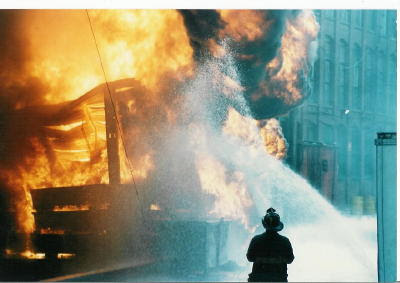The Great Labor Day Fire September 2, 1985
Labor Day and Passaic is burning.
Fire everywhere. Flames lick the edges of our little world, plumes
jumping from the roofs of factories like sun flairs, leaping up hundreds of
feet, crossing over from buildings to building like an unstoppable disease.
The wind makes it worse, taking it up, pushing it on,
setting ablaze new previously untouched buildings one after the next, sparks showing
at first on the faces of this warehouse or that factory, only to explode in
massive clouds of red a moment later.
Battle lines have been drawn, red fire trucks from what seem
like a hundred towns lined up against the heated demon, Passaic, Garfield, Carlstadt,
Lyndhurst, Little Falls, Paramus, Paterson, Wallington, Lodi, even the tiny
Secaucus.
Helicopters buzz over our heads like frustrated bees,
helpless against the crimson monster that consumes the world around us, a
monster slowly edging inch by inch, building by building, block by block to
where we stand.
Now the wall paper
factory flairs up, crossing the street to another mill filled with paper.
The whole thing started hours ago with some people claiming
a transformer set off the paint factory. Repeated booms resounded over the
whole of Dundee Island as if we were caught up in a war zone, mortar shells fired
from some distant place, landing here in the industrial heart of Passaic.
While we, me Julio, Lolo and others stood at first on the
sidewalk staring down 8th Street watching the flames leap from side to side in
their slow advance in our direction, each of us praying it would not reach us,
here, two streets away. For the most part, the fire seemed to spread the other
way faster despite the consistent wind, apparent feeding on the amble fuel, the
array of factories, mills and warehouses had to offer.
Maybe it is the wall of water the fire departments cast that
kept the flames away, firefighters standing firm up and down the block, their hoses
stretched across the pavement like thick pulsating vines, streams of water washing
against the glow of red, then wilting, losing ground, the restaurant a block
away lost to the flames despite the persistent spray.
People wrapped in blankets near us stand and watch as their
homes burn, 18 hours so far with many more expected, eight to ten factories
lost, and the fire still marching on, the fiery glow stark against the rising
smoke behind it, as if we were witnessing the end of the world, with firemen
being sent into the fight as others were withdrawn, shifts changing every few
minutes due to the intense heat.
Hundreds of people already homeless making their way across
the tracks, possessions bundled in plastic bags. Thousands of people unemployed. The electric and
gas turned off.
The sirens wail as more and more fire trucks arrive. Not
enough room for them all on the narrow streets. Not enough hydrants to draw
their water from.
“They’ll be using the river water soon,” says Lolo.
The smell of chemicals and fire make the air taste bitter,
adding some new element to our growing fear.
“Biggest fire ever,” one fire fighter mumbles, hip boots
squeaking as he passes us as he lays out hoses from the church on Wall Street.
A change of wind could kill us all. This makes me think
about war and dying, about being pressed to leave with a cat under each of my
arms and a dog on a leach. I have my possessions packed, but it’s already too
late to get them out now, an hour ago maybe, but not with the streets filled
with fire engines and hoses. We watch helplessly as the people on the next
block get evacuated, carrying what they can on their backs, their faces full of
anguish, all glancing back at the wall of flames chewing up and spitting out
the remains of their homes. Some clutch photo albums. A few carry TVs.
Behind them another mill explodes in flame. Up! Up! The families
shoot! Higher and higher. More booms. Everything is getting worse. The refugees
are cluttering the sidewalks on our block. There is talk of men running from
the scene and of cars exploding in the advancing flames.
Now I know the fear of God, of war, of destruction, doom coming
closer and closer. One woman, seeing me taking notes, mistakes me for a
journalist from a local newspaper.
“The firemen are good,” she says. “They wait and wait.”
Some others claim the fire men arrived early but could not
find water to fight the blaze early on.
I stare at the arches of water and the fire trucks closer to
the fire. They look like toys against the marching disaster.
Someone says, “We’re next to be evacuated.”
I pray they can stop it before we are.

Comments
Post a Comment